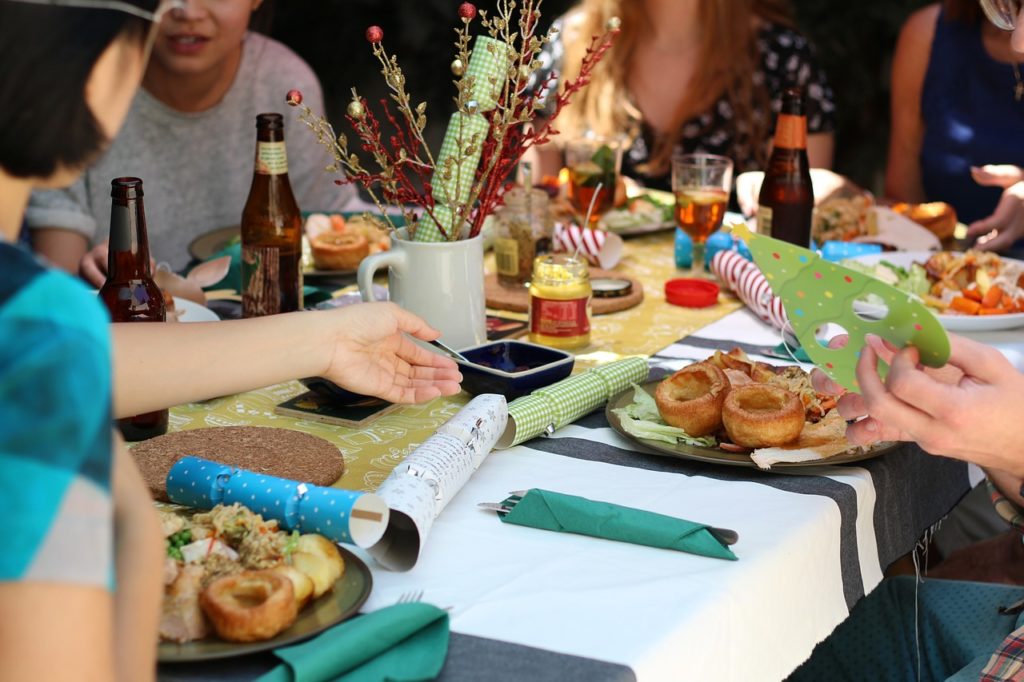- Calls to this hotline are currently being directed to Within Health, Fay or Eating Disorder Solutions
- Representatives are standing by 24/7 to help answer your questions
- All calls are confidential and HIPAA compliant
- There is no obligation or cost to call
- Eating Disorder Hope does not receive any commissions or fees dependent upon which provider you select
- Additional treatment providers are located on our directory or samhsa.gov
Navigating Parties to Support Maintaining Your Meal Plan

Contributor: Crystal Karges, MS, RDN, IBCLC, Director of Content and Social Media at Eating Disorder Hope/Addiction Hope
Love it or hate it, your meal plan can serve as one of the most helpful tools during your recovery from an eating disorder. Rather than serving as rigid guidelines of what you should and should not eat, meals plans give an important framework of what and how much you should eat in any given day. These are constructed and recommended by a Registered Dietitian, who you are likely working with as part of your professional treatment team.
Understanding the Framework of a Meal Plan
Many individuals might worry that following a meal plan gives lack of flexibility when it comes to eating and choosing foods to eat, however, this could not be farther from the truth. Your Registered Dietitian will typically outline a meal plan in a way that allows you to choose the foods you would like within a specific framework. This gives you the freedom to pick foods that fit within your meal plan. For example, if for a snack your meal plan outlines that you need one serving of protein and one serving of carbohydrate, you can choose a snack that fits within these requirements. Your dietitian will work with you to help you understand what counts as serving of each of the food groups.
Approaching Parties With Your Meal Plan
 This type of meal plan allows you the ability to eat anywhere, as essentially every kind of food can fit into your meal plan in some way or fashion. If you are planning on going to a party or some kind of social event, determine what meals/snacks will be eaten at the party. If a party will only be serving appetizers or a light meal, you may need to eat something before hand to ensure that you are getting in everything you need.
This type of meal plan allows you the ability to eat anywhere, as essentially every kind of food can fit into your meal plan in some way or fashion. If you are planning on going to a party or some kind of social event, determine what meals/snacks will be eaten at the party. If a party will only be serving appetizers or a light meal, you may need to eat something before hand to ensure that you are getting in everything you need.
Likewise, if you are planning on having a meal at an event, you can find ways to meet all your constituents. This sometimes requires creativity on your part, such as having an extra serving of something, including a dessert, or more. The main thing to remember is that everything can fit in your meal plan somehow, and learning how to get in everything you need on a daily basis will become more second-nature with consistent practice.
Community Discussion – Share your thoughts here!
What are some possible challenges you might face when going to a party in recovery?
 About the Author: Crystal is a Masters-level Registered Dietitian Nutritionist (RDN) with a specialty focus in eating disorders, maternal/child health and wellness, and intuitive eating. Combining clinical experience with a love of social media and writing, Crystal serves as the Special Projects Coordinator for Eating Disorder Hope/Addiction Hope, where her passion to help others find recovery and healing is integrated into each part of her work.
About the Author: Crystal is a Masters-level Registered Dietitian Nutritionist (RDN) with a specialty focus in eating disorders, maternal/child health and wellness, and intuitive eating. Combining clinical experience with a love of social media and writing, Crystal serves as the Special Projects Coordinator for Eating Disorder Hope/Addiction Hope, where her passion to help others find recovery and healing is integrated into each part of her work.
As a Certified Intuitive Eating Counselor, Crystal has dedicated her career to helping others establish a healthy relationship with food and body through her work with EDH/AH and nutrition private practice.
The opinions and views of our guest contributors are shared to provide a broad perspective of eating disorders. These are not necessarily the views of Eating Disorder Hope, but an effort to offer discussion of various issues by different concerned individuals.
We at Eating Disorder Hope understand that eating disorders result from a combination of environmental and genetic factors. If you or a loved one are suffering from an eating disorder, please know that there is hope for you, and seek immediate professional help.
Last Updated & Reviewed By: Jacquelyn Ekern, MS, LPC on June 29, 2016
Published on EatingDisorderHope.com

The EatingDisorderHope.com editorial team comprises experienced writers, editors, and medical reviewers specializing in eating disorders, treatment, and mental and behavioral health.

